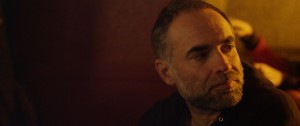
Though “Marvin” was inspired by “The End of Eddy” by Edouard Louis, your Marvin is not an adaptation of that book. Tell us how the film was born.
I felt a very strong connection to the hero of the book by Edouard Louis, and I almost immediately felt like I wanted to make his story my own. I wanted to invent a new destiny for him. Explore the way he had to reconstruct himself after such a difficult separation from that family, and that subculture of France, socially and culturally disinherited. Dream up the crucial influences of his teenage years. In short, adapt it so liberally that “Marvin” could no longer be considered an adaptation, though the book was powerful.
How do you explain the connection that you feel with this character?
I like the idea that powerful people can escape what they are born into, that nothing is ever predestined or doomed, and that it’s possible to transform obstacles into strengths. That is what has always guided me. How do we manage to do that? How do we succeed in transcending difficulties? Those are questions that I, as a completely self-made person, can identify with. Marvin’s journey fascinated me as much as Coco Chanel’s. She, too, was able to invent herself, though she came from an extremely disadvantaged background.
Marvin also has to deal with being different. Having nothing in common with his family or classmates, he is totally alone.
Yes. You’d think he came from another planet. He has the face of an angel, and it’s as if his beauty stimulates the cruelty of others. He is an object of sadistic treatment to his classmates and an object of shame to his family. But that grace, that expression of femininity he carries within him – which is the cause of all that violence – is precisely what will feed his creativity and allow him to find his own path.
Your characterization of the family is never insulting; it even lends them certain humanity.
I felt it was important not to disparage those characters and pin them down like butterfly specimens. It’s their subculture that gave them those often terrifying phrases they say. They do it almost despite themselves; they think from where they stand, with their close-minded languaging. My co-author Pierre Trividic and I didn’t want to judge them.
Despite his ideas, the father is almost touching.
He says “faggots are awful… it’s a disease.” He is obsessed with the norm, but you can tell he is not mean. He has never hit his children, which is already progress by comparison to the previous generation. He is never outright violent. He even makes an effort when he takes Marvin to the train station and gives him money to buy Coca-Cola. He tries to be interested, and that makes him moving because we know full well that he doesn’t care about theater. That’s somewhere else, in another world.
You make him, as well as the character of Marvin’s mother, truly poetic.
There is something theatrical about the father. He makes a show of who he is. He’s not a hick, as his daughter points out. Strangely enough, there is love in that family. It’s lively and complex. Marvin can feed off of that material.
Which feeds them in return?
Yes. In the end, the father manages to say the word “gay” and talk about homosexual marriage. He has opened a door.
The older brother ends up being the only one in the family who is unreachable.
That is also a possible truth of that subculture: the incredible violence that suddenly breaks out from nothing, from the fact that their little brother was hiding in the church to eat candy. Combined with alcohol and his vision of Marvin (a representation of homosexuality), it triggers in Gerald an irrepressible urge to bash. It’s a horrible scene. Dramatically, it was important for the parents to step in. But I wouldn’t say that Gerald is “unreachable.” None of their destinies are set in stone.
You have never delved into that community.
Not being from it myself, I did question my own legitimacy. But I brushed that away pretty quickly. You don’t have to be in it to talk about it. What is essential is to feel things. And I knew them, in a certain way, through one of my grandmothers, who ran a small business under very tough living conditions and who was culturally very close to the Bijou family –
anti-homo, anti-black, anti-everything. As a kid, that intellectual poverty struck me deeply. But she was also a generous woman with amazing humanity. I loved that grandma and got inspiration from her, of course. Just as I got inspiration from the families I met in the area around Epinal – people who are forgotten, living on the edge in incredible poverty and often very close to the Front National. I really settled into the region and stay put. That was the best way to understand it from the inside. Though I’m not obsessed by the documentary aspect, what I showed had to ring true.

